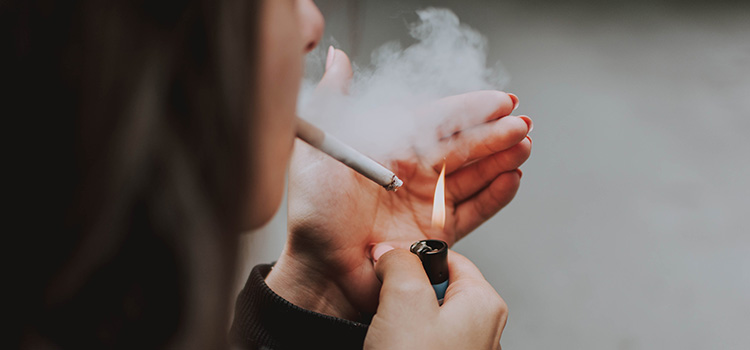Smoking And Teeth Grinding
5th Sep 2021

It is no secret that smoking has many adverse side effects on your health. Similarly, sleep disorders such as bruxism, obstructive sleep apnea, and TMJ also have many negative symptoms on your oral and overall health. Bruxism is often accompanied by facial pain, headaches, earaches, jaw pain, tooth pain, and worn upper and lower teeth. Is there a connection between smoking and teeth grinding?
Researchers and dentists struggle to find a definite cause of bruxism, but there are many suspected causes. Some of these include drinking alcohol, abusing substances, using tobacco, taking antidepressants, and genetic factors. Perhaps the most common cause of bruxism seems to be stress, which can be exacerbated by these substances.
Tobacco, specifically, has many adverse side effects on your oral health and can cause a variety of overall health problems, including gum disease, tooth damage, tooth wear, scalloped tongue and lung cancer. Additionally, cigarette smoking and e-cigarette smoking may be linked to bruxism (teeth grinding) as well.

Does Smoking Cause Teeth Grinding?
While strong evidence to prove smoking causes teeth grinding has not yet been fully substantiated, tobacco use and nicotine dependence have both been connected to teeth grinding in research.
A study titled “Tobacco use and reported bruxism in young adults: A nationwide Finnish Twin Cohort Study” found that smoking and bruxism are related, even though the exact relationship is still unclear. “Heavy smokers were more than twice as likely to be weekly bruxers compared with never-smokers” (Rintakoski et al 2010).
While a connection has been established, more studies need to be conducted to describe a definitive causal relationship between smoking and bruxism.
Related Articles:

Why Does Smoking Cause Teeth Grinding?
Even though the causal relationship has not yet been determined, scientists have theories as to why smoking and bruxism are so closely related. The connection lies in our dopamine levels.
One of the mechanisms behind bruxism is thought to be dopamine levels. Dopamine is a neurotransmitter — a chemical messenger — known as the “feel good” hormone. It is involved in many processes in your body, including digestion, heart function, motor control, pain processing, stress response, and more.
Changes in the levels of dopamine in your brain can increase motor activity, which can cause you to grind or clench. High smoking levels increase dopamine release in your body, thus affecting your motor activity.
According to a literature review of bruxism, “Nicotine stimulates central dopaminergic activities which might explain the finding that cigarette smokers report bruxism two times more than the non smokers” (Shetty et al 2010). Likewise, the American Dental Association (ADA) recognizes the link between tobacco use and bruxism (Bertazzo-Silveria et al 2016).
How to Treat Bruxism
Treating bruxism can improve your oral health and help increase your quality of life. Because the condition can lead to negative side effects like jaw pain, headaches, and tooth damage, finding ways to treat and manage the condition is very important.
Finding a way to decrease or stop your clenching and grinding is the most effective way to treat bruxism. Identifying the root cause of your bruxism is the best way to achieve success in eliminating the behavior. Quitting smoking may be an effective way to stop your clenching and grinding, and it’s good for your overall health as well. If you need help quitting, resources are available to help you. Try visiting smokefree.gov or calling 1-800-QUIT-NOW.
Another treatment option is a mouth guard for teeth grinding or night guard. This is the most common, non-invasive way to treat both awake and sleep bruxism. For those who are trying to quit smoking to treat bruxism, a night guard may be a necessary temporary measure. While quitting may eventually stop your grinding, you should have something to protect your teeth throughout the process.

- Most Popular
- Hard Outside, Soft Inside
- 2MM Thick
- Moderate / Heavy

- Most Durable
- Hard Materials
- 1.5MM Thick
- Heavy / Severe

- For Day Time Use
- Thin, Barely Visible
- 1MM Thick
- Light / Moderate

- For Clenching
- Flexible & Soft
- 1.5MM Thick
- Light / Moderate
You can get a quality night guard from your dentist or from an online retailer like Pro Teeth Guard. To treat temporomandibular joint disorder (TMD) — a related condition — a splint may be necessary. Receiving regular dental care can help you stay on top of conditions such as bruxism and TMD because dentists can often identify teeth wear and other consequences of grinding by examining your teeth or taking x-rays.
You may be able to reduce your clenching and grinding with natural remedies as well, such as yoga or meditation. Seeing a therapist to learn stress reduction techniques may also prove helpful. Bruxism has been related to mental health conditions, such as anxiety and post-traumatic stress disorder (PTSD).
Some bruxism sufferers have found success using botox as well. Botox injected into the jaw muscles can relax the muscles and reduce motor activity. This helps to rest the overactive muscles and prevents grinding/clenching and the painful symptoms of bruxism that accompany them.
Related Articles:
The Link Between Smoking and Bruxism
If you smoke, you may find yourself grinding and clenching your teeth frequently. Smoking, vaping, and e-cigarette use has not yet been proven to cause bruxism, but scientists have found a definite link between smoking and teeth grinding, similar to the connection between alcohol consumption and teeth grinding. This is likely due to the effect smoking has on dopamine levels.
Treating bruxism is possible with natural remedies as well as non-invasive techniques such as using a night guard. If smoking cessation does not stop your grinding, talk to your dentist about using a night guard for bruxism.
Pro Teeth Guard offers custom-fit mouthguards online for an affordable price. Our night guards are made in a professional dental lab, and every night guard is guaranteed to fit comfortably with our 110% money-back guarantee.
References:
- Bertazzo-Silveira, E. (2016). Association between sleep bruxism and alcohol, caffeine, tobacco, and drug abuse. The Journal of the American Dental Association. https://jada.ada.org/article/S0002-8177(16)30541-4/fulltext
- Pietrangelo, A. (2019). How Does Dopamine Affect the Body? Healthline. https://www.healthline.com/health/dopamine-effects#definition
- Rintakoski, K., Ahlberg, J., Hublin, C., Lobbezoo, F., Rose, R. J., Murtomaa, H., & Kaprio, J. (2010). Tobacco use and reported bruxism in young adults: a nationwide Finnish Twin Cohort Study. Nicotine & tobacco research : official journal of the Society for Research on Nicotine and Tobacco, 12(6), 679–683.https://doi.org/10.1093/ntr/ntq066
- Shetty, S., Pitti, V., Satish Babu, C. L., Surendra Kumar, G. P., & Deepthi, B. C. (2010). Bruxism: a literature review. Journal of Indian Prosthodontic Society, 10(3), 141–148. https://doi.org/10.1007/s13191-011-0041-5

- Most Popular
- Hard Outside, Soft Inside
- 2MM Thick
- Moderate / Heavy

- Most Durable
- Hard Materials
- 1.5MM Thick
- Heavy / Severe

- For Day Time Use
- Thin, Barely Visible
- 1MM Thick
- Light / Moderate

- For Clenching
- Flexible & Soft
- 1.5MM Thick
- Light / Moderate

